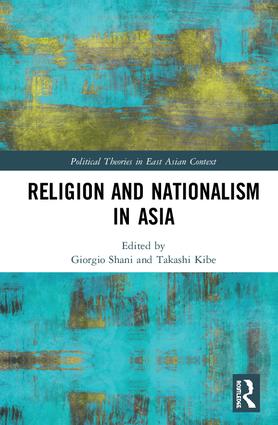New book: Religion and Nationalism in Asia
Edited by Giorgio Shani and Takashi Kibe
Rourtledge 2019
https://www.routledge.com/Religion-and-Nationalism-in-Asia/Shani-Kibe/p/book/9780367183424

This book re-examines the relationship between religion and nationalism in a contemporary Asian context, with a focus on East, South and South East Asia.
Addressing empirical, analytical, and normative questions, it analyses selected case studies from across Asia, including China, India, Iraq, Japan, Pakistan, the Philippines and Sri Lanka and compares the differences and commonalities between the diverse configurations of nationalism and religion across the continent. It then goes on to explain reasons for the regional religious resurgence and asks, is the nation-state model, aligned with secularism, suitable for the region? Exploring the two interrelated issues of legacies and possibilities, this book also examines the relationship between nationalism and modernity, identifying possible and desirable trajectories which go beyond existing configurations of nationalism and religion.
Bringing together a stellar line up of contributors in the field, Religion and Nationalism in Asia will be a valuable resource for students and scholars of Asian religion and politics as well as sociology, ethnicity, nationalism and comparative politics.
Contents
Introduction: Legacies and Possibilities, Giorgio Shani and Takashi Kibe
1. Tagore and the Conception of Critical Nationalism, Sudipta Kaviraj
2. Midnight’s Children: Religion and Nationalism in South Asia, Giorgio Shani
3. Articulations of Religiously-Motivated Nationalism within Philippine Catholicism: A Critical Assessment, Manuel Victor J. Sapitula
4. Reconsidering the Relation between ‘Sectarianism’ and Nationalism in the Middle East, Fanar Haddad
5. The Irony of Secular Nation-Building in Japanese Modernity: Inoue Kowashi and Fukuzawa Yukichi, Takashi Kibe
6. Buddhism, Cosmology, and Great East Asian Co-prosperity Area: Multiculturalism and Nationalism in the Pre-war period Japan, Kosuke Shimizu
7. Political modernity in East Asia: Religion, nationalism and subversion of imperialism, Atsuko Ichijo
8. Religious Nationalism with Non-domination: Ahn Changho's Cosmopolitan Patriotis, Jun-Hyeok Kwak
9. The Structural Problem of Religious Freedom in China: Towards a Confucian-Christian Synthesis, Zhibin Xie
10. Augustine’s Critique of Religious Identity and Its Implications for the Chinese Church, Wei Hua
11. Post-Chinese Reconnections through Religion: Buddhism, Christianity, and Confucianism, Chih-yu Shih
12. Conclusion, Takashi Kibe and Giorgio Shani